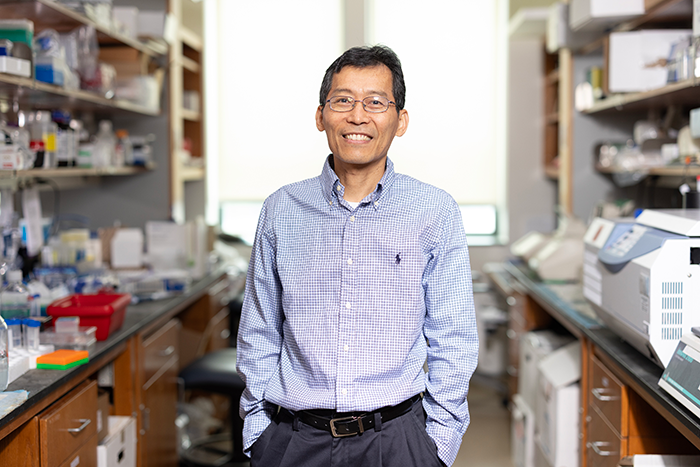
(DURHAM, NC) A Duke University School of Medicine study reshapes what scientists know about how our cells generate energy and fend off cancer.
The Nature Cell Biology study led by cancer researcher Hui-Kuan Lin, PhD reveals an unexpected role for the protein ALDH4A1 in energy production. Without it, cells shift into a survival mode linked to cancer growth.
The discovery not only transforms scientific understanding of cellular metabolism but also points to a promising new target for cancer treatment.
“By connecting ALDH4A1 to both energy production and tumor suppression, we have a clearer picture of why cancer cells behave the way they do,” said Lin, the senior study author who is a professor and director of prostate cancer research in the Department of Pathology and professor of pharmacology and cancer biology at Duke School of Medicine.
At the heart of the discovery is pyruvate, a molecule that helps power cells. Pyruvate is produced when the body breaks down glucose and is a key player in energy production. But for pyruvate to do its job, it must first enter the mitochondria—often called the cell’s power plants—where it fuels the TCA cycle, a process that generates energy.
This transport relies on the mitochondrial pyruvate carrier (MPC), a system made up of two proteins, MPC1 and MPC2. Until now, scientists believed those were the only proteins involved. But Duke researchers have discovered that ALDH4A1 is a critical third component. It helps stabilize and maintain the active MPC complex, ensuring pyruvate gets where it needs to go.

Without ALDH4A1, the system breaks down. Pyruvate can’t reach the mitochondria, forcing cells into survival mode. In the new study, researchers reveal ALDH4A1 acts as a tumor suppressor by preventing cells from switching to a less efficient, backup energy process called the Warburg effect that’s often seen in cancer cells.
“Our study provides the molecular basis of why cancer cells often display defective mitochondrial activity,” said Lin, a member of the Duke Cancer Institute.
ALDH4A1 is part of a family of proline metabolic enzymes. “Many human cancers show a loss of ALDH4A1, and patients with lower levels of ALDH4A1 tend to have worse survival outcomes,” he said.
Lin initiated the study while leading the research team at Wake Forest University. After joining the faculty at Duke in May 2023, he and his team completed the work.
In lab experiments using human liver cancer cells and mouse 3T3 cells, researchers demonstrated that the loss of ALDH4A1 encouraged cell transformation and tumor development. Conversely, increasing MPC activity by overexpressing ALDH4A1 slowed or halted tumor growth.
By targeting this protein, scientists hope to develop therapies that can disrupt cancer’s energy supply and stop it in its tracks.
Study authors include Che-Chia Hsu, Chi-Yun Wang, Rajesh Kumar Manne, Zhen Cai, Vasudevarao Penugurti, Rajni Kant; Ling Bai; Bo-Syong-Pan; Tingjin Chen; Yuan-Ru Chen; Hsin-En Wu; Yan Jin; Haiwei Gu; and Chia-Yang Li.
The study was funded in part by the National Institutes of Health (R01CA256158, R01CA248037 and R01CA270617).